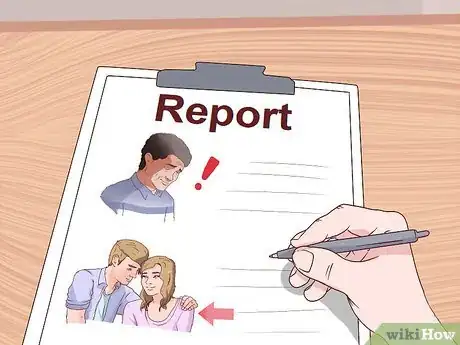This article was co-authored by Clinton M. Sandvick, JD, PhD. Clinton M. Sandvick worked as a civil litigator in California for over 7 years. He received his JD from the University of Wisconsin-Madison in 1998 and his PhD in American History from the University of Oregon in 2013.
wikiHow marks an article as reader-approved once it receives enough positive feedback. In this case, 83% of readers who voted found the article helpful, earning it our reader-approved status.
This article has been viewed 71,540 times.
Elder abuse refers to the intentional abuse of an elderly person by a caregiver or other person. This abuse can cause serious physical, emotional, or financial harm to the elderly person. Elderly people can be some of the most vulnerable people in our society and therefore, if you suspect an elderly person is being abused you should report the abuse to the appropriate authorities.
Steps
Recognizing Elder Abuse
-
1Recognize the types of elder abuse. Elder abuse can come in a variety of forms and all states have laws prohibiting the abuse of the elderly by caregivers or other persons. In order to intervene and report suspected elder abuse it is important that you recognize all of the types of elder abuse.
- Physical abuse of an elderly person can include slapping, punching, unwarranted physical restraint, broken bones or drugging the elderly person so they can not fight back.
- Sexual abuse of an elderly person includes all nonconsensual sexual contact.
- Neglect includes the failure by the caregiver or others to provide necessities of daily living to the elderly person, such as food, clothing, housing and/or healthcare.
- Exploitation may include illegally taking or hiding the financial assets of the elderly person for someone else’s benefits.
- Emotional abuse includes purposefully inflicting mental pain or anguish on the elderly person through verbal or nonverbal acts. These acts may include humiliation, intimidation or threatening the elder.
- Abandonment means that the person responsible for the care of an elderly person fails to take care of the person by not showing up at their home or other place care where care was to be provided.
- Self-neglect refers to the failure of an elder to take care of him or herself to the point that their physical health and well-being may be compromised.[1]
-
2Look for elder abuse signs. Depending on they types of abuse inflicted on the elderly person, there are a variety of signs that indicate elder abuse. These signs may include:
- Bruises, broken bones, cuts, scrapes, or burns.
- Changes in behavior, such as withdrawing from normal activities, a change in cognitive abilities or alertness and depression.
- Signs of assault around the breasts or genital area.
- Loud fights or arguments between the caregiver and elder.
- Tension between elder and caregiver or elder acting timidly.
- Poor hygiene, rapid weight loss or other unattended medical needs.
Advertisement -
3Speak with the elderly person. If you suspect elder abuse or you are generally concerned about changes in the behavior, hygiene or personality of an elderly person you should speak with them. While many elderly people may feel embarrassed or fear retaliation from a caregiver, some elders may also be looking for support or someone to speak to about what is happening to them.
- Some elders will deny abuse is occurring even when it is obvious that they are being abused. This is particularly true when the abuser is a family member.
- Even is an elder denies the abuse, you should still report suspected abuse to the proper authorities who can investigate the matter.[2]
-
4Speak to elder’s family. If the elder is someone you know and you suspect abuse, you can contact the elder’s family and discuss the abuse with them. They may be able to intervene more quickly by firing a caregiver and making the report to the police.
Reporting Elder Abuse
-
1Call for help. If you suspect that an elderly person is being abused, you should report the abuse to the appropriate governmental authority that can intervene. Depending on the circumstances, there are a number of resources for reporting elder abuse.
- If you suspect that the elder is in immediate and potentially life-threatening danger then you should call the police or 911.
- If you suspect elder abuse but do not believe that it is life threatening, you can call the Eldercare Locator by phone at 1-800-677-1116. Trained operators on the hotline can provide you information on local resources and other assistance. The hotline is open Monday through Friday, 9 a.m. to 8 p.m. Eastern Time.
- If you are living outside of the U.S., some elder abuse help lines in non-U.S. countries include: UK: 0808 808 8141 or Ireland: 1800 940 010 (Action on Elder Abuse); Australia: 1300 651 192 (Elder Abuse Prevention Unit); South Africa: 080 111 2131 (Age In Action); and for resources in Canada visit http://www.albertaelderabuse.ca.[3]
-
2Make a report. It is not your responsibility to prove that elder abuse is occurring but rather to provide the authorities with a detailed report about your suspicions of elder abuse. When making a report, consider including the following types of information:
- The name, address and contact information for the elder you suspect is being abused.
- Provide information about the elder’s family supports, if any.
- The identity of the person you suspect is abusing the elder.
- Your contact information.
- Any of the elder’s known medical conditions
- Specific information about the abuse, such as incidents of bruising, yelling or the failure of the elder to care for himself or herself.
- Continue to report additional incidents of abuse.
-
3Await next steps. After you make a report, Adult Protective Services (APS) in the area screens all help line calls and makes a decision about whether a report rises to the level of elder abuse in violation of state laws. APS may assign a caseworker to conduct an investigation into the alleged elder abuse.
- In emergency cases, a caseworker may conduct an investigation within 24 hours of the report.
- If APS does not believe that elder abuse is occurring, they will try to coordinate with social and health services to provide assistance to the elder in need.
- It is important to note that an elder can refuse assistance from APS. Unless the elder is incapacitated, APS has to respect the elder’s wishes.
- In addition to APS, local police or district attorneys may also investigate claims of elder abuse especially if the report mentions physical or sexual abuse.
- In the case of abuse in a nursing home, state’s have long-term care ombudsman programs that are specifically responsible for investigating and resolving nursing home complaints.
Preventing Elder Abuse
-
1Look for elder abuse risk factors. If an elder is being cared for in his or her home, you should be aware of potential risk factors for elder abuse. These risk factors may include:
- A caregiver’s substance abuse habit, which may place an elder at increased risk of financial abuse.
- A history of domestic abuse may place the elder at higher risk for abuse later in life.[4]
-
2Speak with elders and caregivers. By calling the elder and visiting often, you will have a better sense of what is occurring in the home or nursing facility. Try to establish a trusting friendship so that the elder may come to you if he or she is feeling abused or concerned about his or her physical welfare. Additionally, try to provide the caregiver, particularly family member caregivers, with a regular break. This may help an increasingly overburdened or frustrated caregiver from lashing out at the elder.[5]
-
3Protect yourself. If you are an elder, there are steps that you can take to protect yourself against elder abuse. These steps include:
- Getting your legal and financial affairs in order so it is more difficult for someone to steal from you.
- Maintain regular contact wit friends and family members so that you do not become isolated and more vulnerable to abuse.
- If you are unhappy about a caregiver tell someone that you need a change.
- If you are being abused, tell someone so that they can help you or provide you with the phone number to report the abuse yourself.[6]
-
4Ask for help if you are a caregiver. Acting as a full time caregiver can be emotionally and physically draining. If you are feeling overwhelmed, angry or frustrated by the caregiving demands, you may need help.
- Ask for help from friends and family or local respite care agencies. Even a short break may help you feel better.
- Use an adult day care program for the elder to provide you with assistance in your caregiving responsibilities.
- Take care of your physical and mental health needs. If you are feeling depressed, you should speak to a counselor or therapist since depression may lead to elder abuse.
- Join a support group with other caregivers of elders.[7]
-
5Demonstrate alternatives for the elder. One reason that an abused elder may refuse to report abuse is because he or she believes there are no other caregiving alternatives. If an elder expresses this concern, consider the following:
- Take the elder on tours of assisted living facilities to demonstrate that there are alternatives to home care.
- Offer the elder assistance services on a trial basis such as house cleaners or a weekly home health aide to assist the elder with discrete tasks.
- Inform them of support services and other outside programs that can help held reduce the demands on the caregiver and the elder.[8]
References
- ↑ http://www.helpguide.org/articles/abuse/elder-abuse-and-neglect.htm
- ↑ http://www.helpguide.org/articles/abuse/elder-abuse-and-neglect.htm
- ↑ http://www.helpguide.org/articles/abuse/elder-abuse-and-neglect.htm
- ↑ http://www.helpguide.org/articles/abuse/elder-abuse-and-neglect.htm
- ↑ http://www.helpguide.org/articles/abuse/elder-abuse-and-neglect.htm
- ↑ http://www.helpguide.org/articles/abuse/elder-abuse-and-neglect.htm
- ↑ http://www.helpguide.org/articles/abuse/elder-abuse-and-neglect.htm
- ↑ http://www.helpguide.org/articles/abuse/elder-abuse-and-neglect.htm
About This Article
If you suspect someone is experiencing elder abuse and is in immediate danger, call the police. To report abuse that is not life-threatening in the United States, call the Eldercare Locator at 1-800-677-1116. When you speak with authorities, it is not your responsibility to prove any abuse, but you should give them a detailed report of your suspicions that includes names of the victim, suspect, and specific information about the abuse. After you make a report, Adult Protective Services will determine if the situation rises to the level of elder abuse. For more advice from our Legal co-author, like how to prevent elder abuse, scroll down.










































































